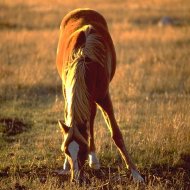Research provides fresh insight into colic causes

Colic is one of the most common causes of death in horses and ponies.
A gastrointestinal disorder which causes colic in horses is more prevalent from July-November, in horses up to the age of five, according to Lancashire researchers.
Idiopathic focal eosinophilic enteritis (IFEE) is a cause of colic or abdominal pain in horses.
Colic has significant financial and welfare implications and is one of the most common causes of death in horses and ponies. The cause of IFEE is not currently known, however.
Researchers from Lancaster University and the University of Liverpool wanted to find out how the age of the horse, time of year and geographical location affect the risk of IFEE.
They used data gathered over a 10-year period from horses and ponies admitted to Liverpool's Philip Leverhulme Equine Hospital for exploratory examination to determine possible causes of colic. Out of 933 cases, 85 had IFEE.
The research team used advanced techniques in spatial statistics to analyse the data. According to the findings, which were published in the journal Plos ONE, researchers detected a seasonal pattern, with July-November being the 'riskiest' time of year.
Younger horses up to the age of five were found to be most at risk. In addition, the findings suggest IFEE is more prevalent in Lancashire than nearby counties. The study covered a region from Leicestershire to Cumbria.
Researchers say further work should be done to investigate environmental factors such as soil types and pathogens linked to similar spatial patterns of disease in other species.
Equine specialist Debra Archer from the University of Liverpool said: "This work enables us to better identify horses at risk of IFEE and has provided some clues about the possible cause of the condition which requires further research.
"Horse owners in the Lancashire area should be aware that the chances of their horse or pony developing this condition overall are still relatively low but we would appear to see more cases of IFEE here than anywhere else in the study region.
"It is important that we continue to try to find out what the underlying cause is to determine whether it can be prevented from occurring."



 The RCVS has announced a new version of its 1CPD mobile app, with enhanced features for veterinary surgeons and veterinary nurses to record their continuing professional development.
The RCVS has announced a new version of its 1CPD mobile app, with enhanced features for veterinary surgeons and veterinary nurses to record their continuing professional development.